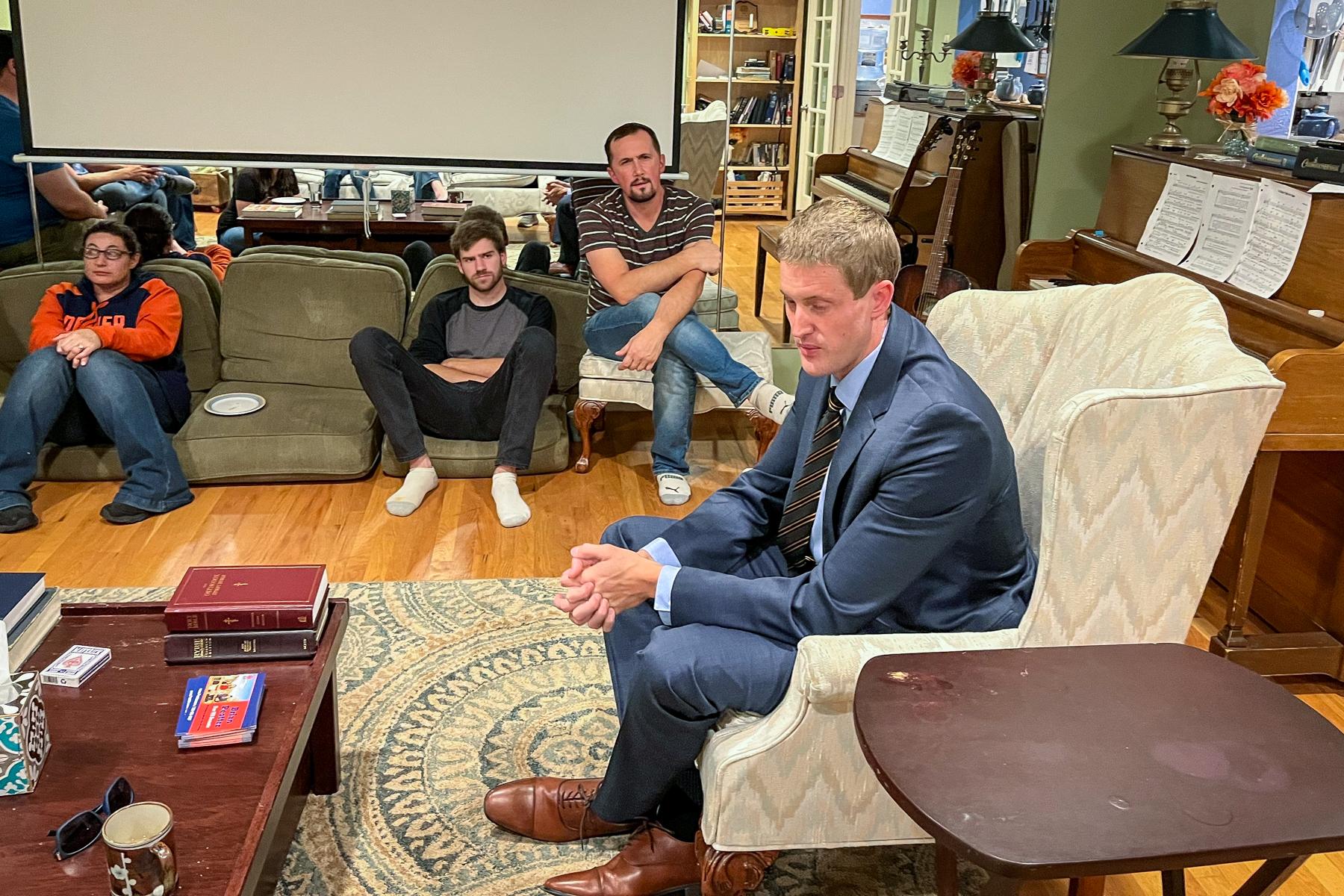
Colorado Republicans and the Libertarian Party of Colorado will head into the next election year with a first-of-its-kind collaboration in the state.
Colorado GOP Chair Dave Williams called the agreement unprecedented in an announcement email to party supporters, and said he believes it will greatly benefit Republicans by preventing “spoiler candidates” from entering races in 2024.
Libertarians have agreed not to enter political races where the GOP candidates meet their standard for "pro-liberty" candidates. The idea, supporters say, is to create a coalition that can help Republicans win close seats while giving Libertarians more influence in picking officeholders who can advance their ideals.

In 2022, Republicans placed some of the blame for their defeat in the 8th Congressional District on the Libertarian candidate in the race. Richard Ward pulled in 9,280 votes, more than five times Democrat Yadira Caraveo’s margin of victory.
For some Libertarians frustrated after years of electoral disappointments — their 2022 Senate candidate Brian Peotter drew less than 2 percent of the vote — this looks like a way to leverage their political power and elect candidates they’re more aligned with.
"We would prefer to work with you, and not against you, to support the Colorado that your voters believe they are supporting. We are committed to working with you to end [Democrats'] one-party rule here in Colorado,” stated a letter from Hannah Goodman, chair of the state’s Libertarian Party.
The Libertarian Party said they did reach out to Colorado Democrats asking to work together as well but have yet to receive a response.
Democratic State Party Chair Shad Murib told CPR News that the Colorado Republican Party’s problem is not Libertarians spoiling elections for them. “Their problem is that their platform is opposed by the vast majority of Colorado voters. If their path to victory is to embrace folks who are even more extreme than them, I’d remind them that two wrongs don’t make a right.”
Democratic Gov. Jared Polis also weighed in after Williams announced the GOP’s deal, reminding Libertarians about some of the parts of their limited-government philosophy that more closely align with the left, or at least with him.
“...if you run more pro-liberty candidates who support a woman’s right to choose, the freedom to marry who you love, reducing the income tax, private property rights to build housing on your own land, and legal Cannabis and Psilocybin small businesses then… maybe you can start calling your nominees Democrats,” Polis wrote on Twitter.
What Libertarians can gain
At a recent monthly meetup of Libertarians in Denver, the small group of attendees expressed support for the deal, in the hope that it will make the minor party more relevant in the state, and help disrupt one-party rule.
In the last few election cycles Colorado Democrats have further cemented their political power. They currently hold every statewide office and their widest legislative majorities in state history, as well as both U.S. Senate seats and five of the eight congressional seats.
Aron Lam, the mayor of Keenesburg, is one of Colorado’s few Libertarian officeholders. He said he views the agreement as a net positive, noting that voters here have never elected a Libertarian to statewide office.
“I think the philosophy behind this effort — which again, it's a non-binding contract, as everyone has acknowledged at this point — is an effort of goodwill to hopefully make the Republican party choose candidates that are more libertarian,” he said.
Lam sees a lot of overlap between Libertarians and Republicans on issues like government overreach, taxes, and second amendment rights, and views the GOP as becoming in many ways a perpetual minority political party in Colorado.
“I think that this is the only reason that the Republicans chose to make this kind of deal, or to come to this kind of agreement is because they recognize that they've lost power.”
The Libertarian Party bills itself as an alternative to the “broken two-party system.” Its main principles are that individuals should be sovereign over their own lives and that government intervention generally exacerbates, not solves, problems.
“No one is forced to sacrifice his or her values for the benefit of others,” states the preamble of the Colorado party’s platform.
But how the party will determine whether a Republican candidate is sufficiently “pro-liberty” could prove fairly subjective.
The party opposes the War on Drugs, supports Second Amendment rights and gay marriage, and has recently shifted to neutral on the topic of abortion, stating that individual candidates should follow their consciences on the issue. When it comes to managing the border, the state party platform recognizes, “…the rights to unrestricted travel, trade, and immigration while reserving the right to defend against specific and credible threats.”
Libertarians generally oppose foreign military support and spending and the party platform calls for a non-interventionist U.S. foreign policy.
For Lam, deciding whether a Republican candidate is Libertarian enough for him will be somewhat fluid, depending on the candidate and the race. He said he understands there likely won’t be candidates that align perfectly with the party platform.
While some Libertarians have criticized the deal on social media, saying that the Republican Party can’t be trusted, Lam said he views the agreement as more of a starting point for negotiations over candidates, since it is non-binding.
“Fellow Libertarians call this more of a threat (against Republicans) than an agreement because it could be construed that way depending on how you read the letter. You know, ‘if you don't do this, then we will do this,’” he said.
That’s a concern for Republican political consultant Ryan Lynch. He acknowledged that not having a Libertarian opponent could be huge for the GOP in certain key competitive districts. But Lynch worries about creating a Libertarian litmus test for potential Republican candidates.
“Will the Libertarian Party endorse Republican primary candidates? Could that have a major influence on the outcome of a primary?” He asked, noting that a lot of the details are unknowns.
What Republicans seek to gain
For many Republicans, the last election was the perfect argument for doing more to keep Libertarian candidates out of tight races.
In Colorado’s newly created 8th Congressional District, Democrat Yadira Caraveo won by .69 points, while Libertarian Richard “Dan” Ward received about 4 percent of the total. Republicans believed he diverted votes that would have otherwise gone to GOP candidate Barbara Kirkmeyer.
“So if you go back … and you pull out the Libertarian that took away a bunch of votes, this wouldn't have been as competitive a race and I would've won,” Kirkmeyer said in an interview after the election.
However, Ward’s own campaign disputes that idea. Press secretary Patty McMahon acknowledged Ward had an impact, but she’s skeptical that he acted as a spoiler for Kirkmeyer.
“Our theory has been, Dan brought out voters that would've never voted,” said McMahon.
Next year, CO-8 will be back in play, making it a prime pickup opportunity as Republicans try to expand their majority in the U.S. House. They will also have to defend Colorado’s 3rd Congressional District, where Lauren Boebert won last time by less than 600 votes in a race that did not include a Libertarian candidate.
McMahon said she’s neutral on the deal but has a lot of questions about how it would actually be implemented.
“These are candidates. These are not theories.” She said it’s incumbent on leaders in both parties to provide details. “You have to tell these voters what these candidates are gonna look like because the GOP has primaries, and if they can't agree on it, the voters need to know this.”
Libertarian State party Chair Hannah Goodman outlined some ideas of how she would define pro-liberty, “Being a very firm free market capitalist, all for healthcare rights, parental rights, really strong on the Second Amendment, unwavering on liberty,” she said on Free State Colorado’s youtube channel.
For his part, GOP chair Williams said on the Liberty Lockdown podcast that those details are still being worked out but that Libertarians should hold his party accountable if they don’t like the candidates the GOP puts forward. He’s floated the idea of creating some type of pledge.
“Let's put some items on paper and ask all of our primary candidates to sign it,” he said on the podcast. “They can agree or not agree, this is a free country, they can run. And if they don't conform to the basic standards that we're trying to work out right now, then Libertarians, go run someone. You know, fine, go do it.”
Williams pushed back against the idea that the deal puts Libertarians in a subservient position to Republicans.
“If we want to maximize our chances of defeating Democrats, we better perform. And that's how you should look at it,” he told podcast host Clint Russell. Russell, a Libertarian, later added that while he was skeptical of Republicans in general, he liked Williams’ ideas and was giving his tacit approval to the arrangement.
“But I will absolutely destroy you if you screw me over,” he said laughing.
Other Republicans worry the arrangement gives too much power to Libertarians and will make the GOP more beholden to outside forces.
Former Republican Party Chair Kristi Burton Brown criticized the deal on Twitter, a rare public rebuke on the current direction of the party. She told CPR News that it’s her view that no other political party should have a say in who Republicans nominate. “That’s a sure way to get non-conservatives elected.”
Other longtime party members, like former El Paso County Party Vice Chair Karl Schneider, say parts of the Libertarian Party platform make the arrangement problematic.
“Necessity makes strange bedfellows,” he said in an email. “That the chair of the Republican Party of the State of Colorado would make an agreement with a party that has an ideology that would allow for things that the Republican party is supposedly against (Drugs, Abortion, you name it) says it all.”
Indeed, when asked about the biggest points of divergence among the parties, Williams did point to drug policies, although he said he personally believes the War on Drugs has been a complete failure.
“I think most people would agree that dumping billions of dollars into this war where we militarize the police is not working. But, you know, there's a lot of people within the GOP that would also say, ‘well, where does this end? Right? Are we gonna legalize cocaine, for example?’”
And Williams argues the arrangement will help ensure his party’s candidates stay true to GOP ideals.
“Ultimately, I want to use this as a way to encourage and persuade wayward Republicans or Republicans who may not agree with me that hey, it's within your best interest to actually go for more limited government, pro-liberty, pro-freedom candidates.”
While Libertarian candidates have only earned a fraction of voter support in recent years, there are signs of gaining momentum.
The party gained a lot of ground in 2016 when Donald Trump was first on the ballot. That year, the party’s presidential ticket captured 5 percent of the vote in Colorado.
Russell said the deal has been controversial among fellow Libertarians but sees it as a way to create a better GOP rather than to subvert Libertarians.
“If the Libertarian candidate can't win, but they can actually leverage their small vote tally to get better candidates that are actually elected, it seems like a win-win, from my vantage point.”
Andrew Kenney contributed to this report
Related stories
- Why Republicans are blaming a metalhead Libertarian for their loss in Colorado District 8
- As Colorado gets bluer, Republicans find fellowship at Western Conservative Summit
- Colorado has a new minor political party, and it’s all about No Labels
- Libertarianism Was Born In Westminster And Other Historical Party Facts








